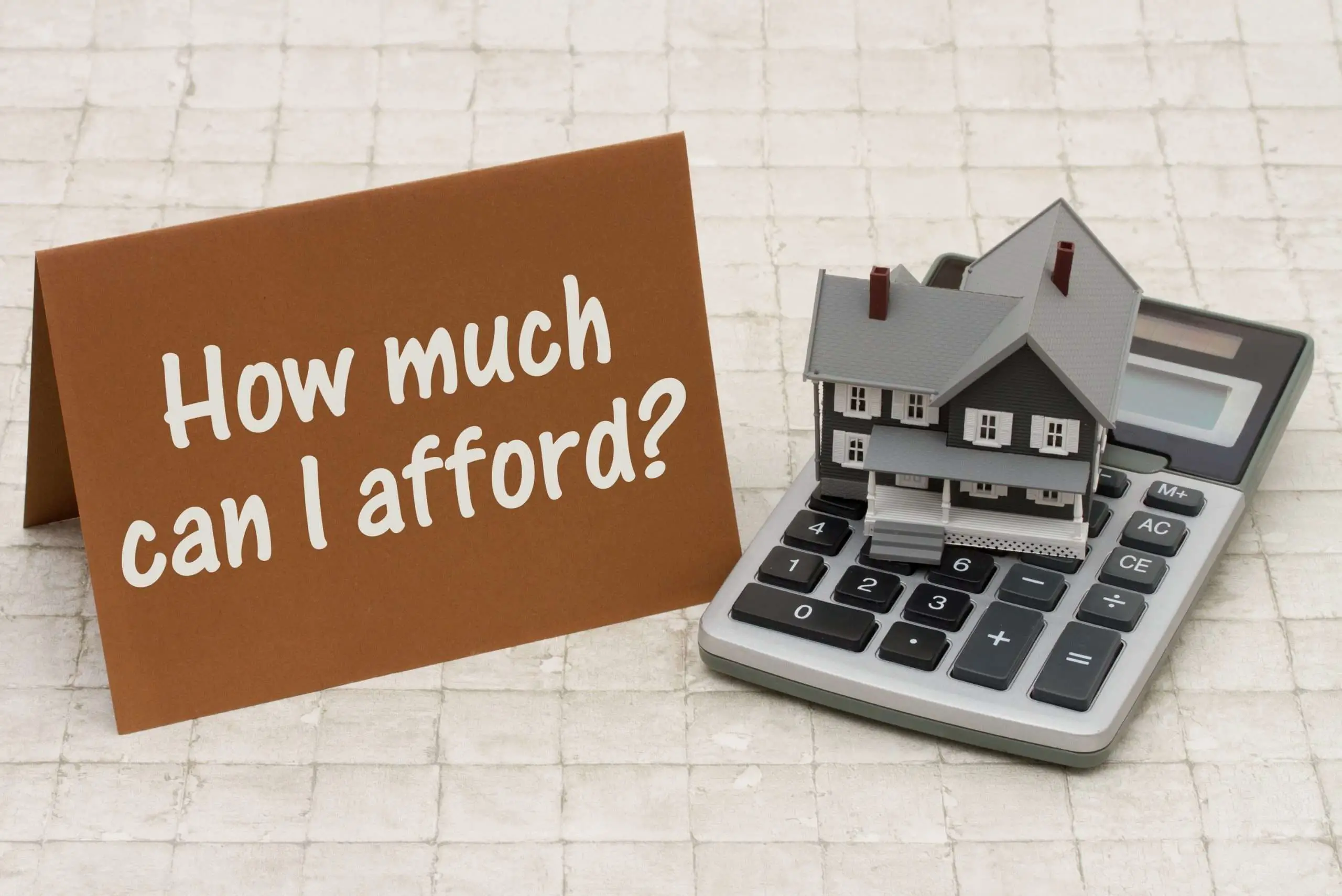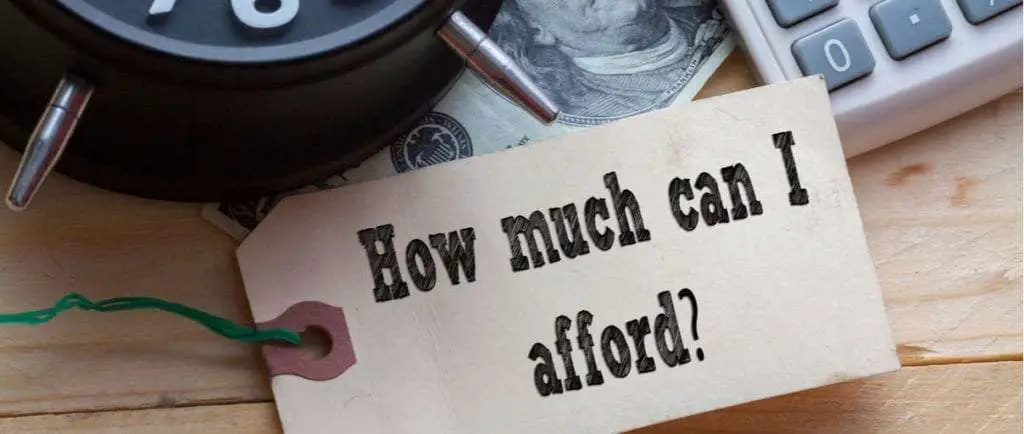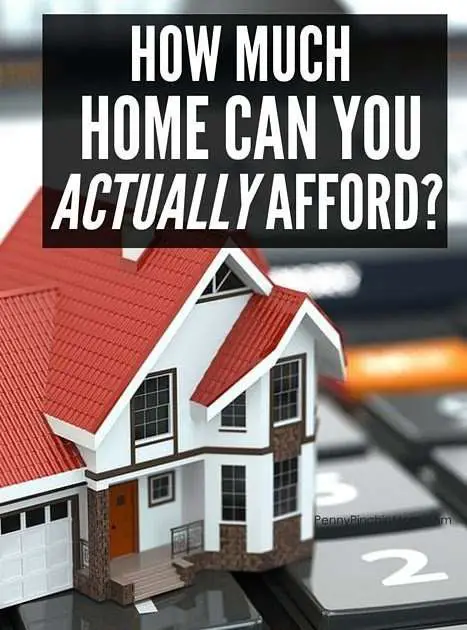Don’t Be Fooled By The 5
Kaplan says homeowners usually need to stay put for at least five years to make the closing costs of buying a home worthwhile. That’s a useful rule of thumb, but if you’re thinking of staying that long, you may be tempted to opt for a mortgage that’s higher than you can comfortably afford now. Be careful. Predicting future income isnt as easy as it may seem. Kaplan cautions that stretching your budget can backfire if you become unemployed for an extended period.
When they’re planning for the long term, many homebuyers may also see their home as an investment for the future, which can be an excuse for spending more today than they can easily afford. But real estate can be volatile, as we saw in the 2008 housing crash. Having too much of your net worth tied up in your home can be risky.
How Much Mortgage Can I Afford
Even though Martin can technically afford House #2 and Teresa can technically afford House #3, both of them may decide not to. If Martin waits another year to buy, he can use some of his high income to save for a larger down payment. Teresa may want to find a slightly cheaper home so sheâs not right at that maximum of paying 36% of her pre-tax income toward debt.
The problem is that some people believe the answer to âHow much house can I afford with my salary?â is the same as the answer to âWhat size mortgage do I qualify for?â What a bank is willing to lend you is definitely important to know as you begin house hunting. But ultimately, you have to live with that decision. You have to make the mortgage payments each month and live on the remainder of your income.
So that means youâve got to take a look at your finances. The factors you should be looking at when considering taking out a mortgage include:
- Income
- Private mortgage insurance
- Local real estate market
Plugging all of these relevant numbers into a home affordability calculator can help you determine the answer to how much home you can reasonably afford.
But beyond that youâve got to think about your lifestyle, such as how much money you have leftover for travel, retirement, other financial goals, etc. You might find that you donât want to buy the most expensive home that fits in your budget.
Tips For Buying An Affordable Home
Suppose you qualify for a large home loan. While your lender is willing to loan you a substantial amount of money, that doesnt mean you have to borrow the entire amount if it would put you under significant financial strain.
Assessing how much you should spend on a house requires a bit of a look into your current and predicted future financial situation. Before you take on the maximum loan you can get and start looking at more expensive houses, consider these tips.
Don’t Miss: Langley Federal Credit Union Auto Loan
What Is A Good Income To Buy A House
Once again, the answer to this question will depend on where you want to buy and what kind of property you want. Your credit score and DTI will also be important factors in determining what interest rate and loan terms you get from the lender.
The higher your credit score, the better the interest rate you are offered therefore, you might be able to own a higher priced home than someone with a low credit score.
How Much Home Can I Afford

Purchasing a home is a decision that will impact your financial situation for the next 15 to 30 years. Its important to calculate your monthly income and expenses carefully to avoid winding up with a mortgage loan you cant pay in the long run.
And, if youre ready to buy, visit our best mortgage lenders page to find the right lender for you.
How much house you can afford will mainly depend on the following:
- Your loan amount and mortgage term
- Your gross monthly and annual income
- Your total monthly debt or monthly expenses, including credit card debt, student loan payments, car payment, child support, and other expenses
- State property taxes, which are paid annually or biannually and vary by state
- Current mortgage rates and closing costs, which vary by location
- Homeowners association and condo fees
Generally, most new homebuyers will consider taking out a conventional mortgage loan. These loans typically require a down payment of no less than 3% of the property value, a minimum credit score of 620, a debt-to-income ratio of 36% and that the monthly payment doesnt exceed 28% of the buyers pre-tax income.
Lenders will also look at a buyers ability to deal with all the fees and upfront costs associated with buying a home, such as closing costs and insurance fees.
You May Like: What Is Draw Period On Heloc Loan
What Are The Upfront Costs Of Buying A Home
In addition to your down payment, you will have to pay a range of closing costs when you buy a home, which include an appraisal, title insurance, an origination fee for the mortgage, real estate attorney fees and more. The total will vary depending on what your lender charges, whether youll pay real estate transfer taxes and if the seller agrees to cover a portion of the fees. As youre budgeting for a home purchase, its wise to plan for between 2 percent and 5 percent of the homes purchase price. So, if youre buying a $400,000 home, your closing costs might range between $8,000 and $20,000. Some lenders might give you the option to roll those costs into the loan to avoid paying for them out-of-pocket. Keep in mind, though, that youll pay interest on them if you choose that option.
How Do I Use The Mortgage Qualifying Calculator
The mortgage qualifying calculator allows you to calculate the amount of mortgage you may qualify for in several ways. To select how you’d like to calculate, select one of the options from the drop-downs on “Calculate for.” Your options are:
- Total monthly payment: Calculates the total mortgage you may qualify for to hit a desired monthly payment.
- Annual income: Calculates the total mortgage you may qualify for based on your yearly income.
- Purchase price: Shows how much income you’d need to make to qualify for a mortgage at a specific purchase price.
Don’t Miss: Can You Loan Money To Your Own Llc
How Much Of A Down Payment Do You Need For A House
A 20% down payment is standard, if you can afford it. Though some mortgage loans may only require as little as 3.5 percent down, or none at all, a larger down payment will have a greater impact on your monthly mortgage payment.Your down payment effectively reduces the total amount of your home loan, which increases your home affordability estimate, and at the same time, decreases your mortgage payment each month. For example, below is a chart showing how a certain level of down payments, based on a percentage of the sale price, directly impacts your monthly mortgage payment :
| Percentage |
|---|
List out your expenses and then add them together to get your total monthly spending.
Raise Your Credit Score
There are several ways to improve your credit score. First, its important to check your credit report from all three bureaus Experian, TransUnion and Equifax for inaccuracies. If there are mistakes in your credit history, you can file a dispute with the credit agencies. They are legally required to address any inaccuracies promptly.
If the information being reported is accurate, make sure to resolve any collections accounts, pay your outstanding debt on time every month and, if possible, reduce your overall credit card debt. The higher your credit score, the lower your interest rate.
Don’t Miss: How Often Can You Use Your Va Home Loan
How To Calculate Your Debt
To find your debt-to-income ratio, first add together all of your monthly debt payments. For example, if you pay $200 each month on a student loan, $400 on a personal loan and $500 on an auto loan, your total debt payments are $200 + $400 + $500, which equals $1,100.
Next, determine your gross monthly income.
Take your total debt payments and divide that number by your gross monthly income. Lets say for this example that your monthly income is $4,000. Then your total monthly debt payments divided by your gross monthly income is $1,100 ÷ $4,000, or 0.275. We can convert the result to a percentage: 0.275 x 100% = 27.5%.
Next: See How Much You Can Borrow
You’ve estimated your affordability, now get pre-qualified by a lender to find out just how much you can borrow.
-
What will your new home cost? Estimate your monthly mortgage payment with our easy-to-use mortgage calculator.
- Award Ribbon
Use our VA home loan calculator to estimate payments for a VA loan for qualifying veterans, active military, and military families.
- Dollar Sign
Your debt-to-income ratio helps determine if you would qualify for a mortgage. Use our DTI calculator to see if you’re in the right range.
- Pig Refinance calculator
Interested in refinancing your existing mortgage? Use our refinance calculator to see if refinancing makes sense for you.
Participating lenders may pay Zillow Group Marketplace, Inc. a fee to receive consumer contact information, like yours. ZGMI does not recommend or endorse any lender. We display lenders based on their location, customer reviews, and other data supplied by users. For more information on our advertising practices, see ourTerms of Use & Privacy. ZGMI is a licensed mortgage broker,NMLS #1303160. A list of state licenses and disclosures is availablehere.
Also Check: Who Should I Refinance My Car Loan With
How The Loan You Choose Can Affect Affordability
The loan you choose can also affect how much home you can afford:
- FHA loan. Youll have the added expense of up-front mortgage insurance and monthly mortgage insurance premiums.
- VA loan. You wont have to put anything down and you wont have to pay for mortgage insurance, but you will have to pay a funding fee.
- Conventional loan. If you put down less than 20%, private mortgage insurance will take up part of your monthly budget.
- USDA loan. Both the upfront fee and the annual fee will detract from how much home you can afford.
Find Out How Much Mortgage You Can Afford

Weâll help you figure out what home price you may be able to afford.
Ready to start looking for your dream home? Donât just dream about it â let the TD Mortgage Affordability Calculator help you begin your search. Enter a few key details and the calculator will guide you in determining, with confidence, what house price may be within reach.
Step 1 of 6
Recommended Reading: How Much Down Payment Is Required For Conventional Loan
Bottom Line: Home Affordability Begins With These Key Factors
Dont let rising home prices automatically scare you away. Being able to purchase a property starts with these questions:
Do you pay your bills on time? A history of no late payments will make you look good in the eyes of any lender. Theyll know that they can expect to receive your mortgage payment each month when its due.
Do you have proof of steady income? If you have a steady job that deposits a similar amount into your checking account every two weeks, youre in good shape. Lenders will evaluate your bank accounts, review recent pay stubs and look at your tax forms. If youre self-employed or earn irregular income, youll need to show even more evidence of your earnings likely the past two years of tax returns.
Do you have a low debt-to-income ratio? If youre earning a lot more money than youre paying back for other debt, youre in a good position.
Whats the best mortgage rate you can get? The lower your rate, the more youll save on interest payments. The good news: If you answered yes to the previous three questions, youll likely qualify for the lowest rates a lender can offer.
Understand The 28/36 Rule
Lenders may determine your ability to afford a new home by using the 28/36 rule. This rule states that:
- Housing expenses should be no more than 28% of your total pre-tax income. This includes your monthly principal and mortgage interest rate, home insurance, annual property taxes, and private mortgage insurance payments .
- Total debt should not exceed 36% of your total pre-tax income. This includes the housing expenses mentioned above as well as credit cards, car loans, personal loans, and student loans, so long as these monthly debt payments are expected to continue for 10 months or more. This does not include other monthly expenses such as groceries, gas or your current rent payments.
In concrete numbers, the 28/36 rule means that a borrower who makes $5,000 a month should not spend more than $1,400 on housing costs every month.
If youre a renter making $5,000 a month, its a good rule of thumb to spend a maximum of $1,400 on rent. However, for a homeowner making the same amount, $1,400 should cover your monthly mortgage payment, as well as homeowners insurance premiums and property taxes.
You May Like: How To Lower The Interest Rate On Your Car Loan
What Is The Required Debt
Online resource Investopiea.com explains that the lower an applicants debt-to-income ratio, the greater the chances that the borrower will be approved for a credit application.
As a customary rule, 43 percent is the highest debt-to-income read DTI ratio a borrower can have and still be qualified for a mortgage.
However, lenders prefer a debt-to-income ratio lower than 36 percent, with no more than 28 percent of that debt as a mortgage or rent payment.
In reality, though, the maximum DTI ratio varies from lender to lender.
How Much House Can I Afford With A Conventional Loan
If you are taking out a conventional loan and you put down less than 20%, private mortgage insurance will take up part of your monthly budget. The PMIs cost will vary based on your lender, how much money you end up putting down, as well as your credit score. It is calculated as a percentage of your total loan amount, and usually ranges between 0.58% and 1.86%.
Also Check: Where Do I Apply For Student Loan Forgiveness
What Affects Home Loan Affordability
Home loan affordability is influenced by a variety of factors such as those given below:
What Is Mortgage Required Income
Lenders consider two main points when reviewing loan applications: the likelihood of repaying the loan and the ability to do so .
Nerdwallet.com explains that mortgage income verification, even if they have impeccable credit, borrowers still must prove their income is enough to cover monthly mortgage paymen
Don’t Miss: How Much Is The Loan Interest Rate
The Monthly Income Rule
If you want to focus your search even more, take the time to think about your monthly spending. While the Consumer Financial Protection Bureau reports that banks will qualify mortgage amounts that are up to 43% of a borrower’s monthly income, you might not want to take on that much debt.
“You want to make sure that your monthly mortgage is no more than 28% of your gross monthly income,” says Reyes.
So if you bring home $5,000 per month , your monthly mortgage payment should be no more than $1,400.
“With a general budget, you want to have 50% of your income going toward utilities, mortgage and other essentials,” says Reyes. Keeping your mortgage payment under 30% of your income ensures you have plenty of room for the rest of your needs.
How Down Payment Size Impacts Home Equity

| Percentage | |
|---|---|
| $250,000 | $0 |
The rule of thumb still stands: 20% of the home value is the ideal amount of money for a down payment. This amount buys you equity in the home, which helps secure the loan. When you donât have a least 20% to put down, you have to find alternate means to secure the mortgage.
This can mean private mortgage insurance , which is an added monthly charge to secure your loan. If you donât have enough money for a down payment, many lenders will require that you have mortgage insurance. Youâll have to pay your monthly mortgage as well as a monthly insurance payment, so itâs not the best option if your budget is tight.
Youâll stop paying PMI when your mortgage reaches about 78% of the homeâs value. While certain homebuyers can qualify for little or no down payment, through VA loans or other 0% down payment programs, most homeowners who donât have a large enough down payment will have to pay the extra expense for PMI.
Also Check: How To Use Va Home Loan
